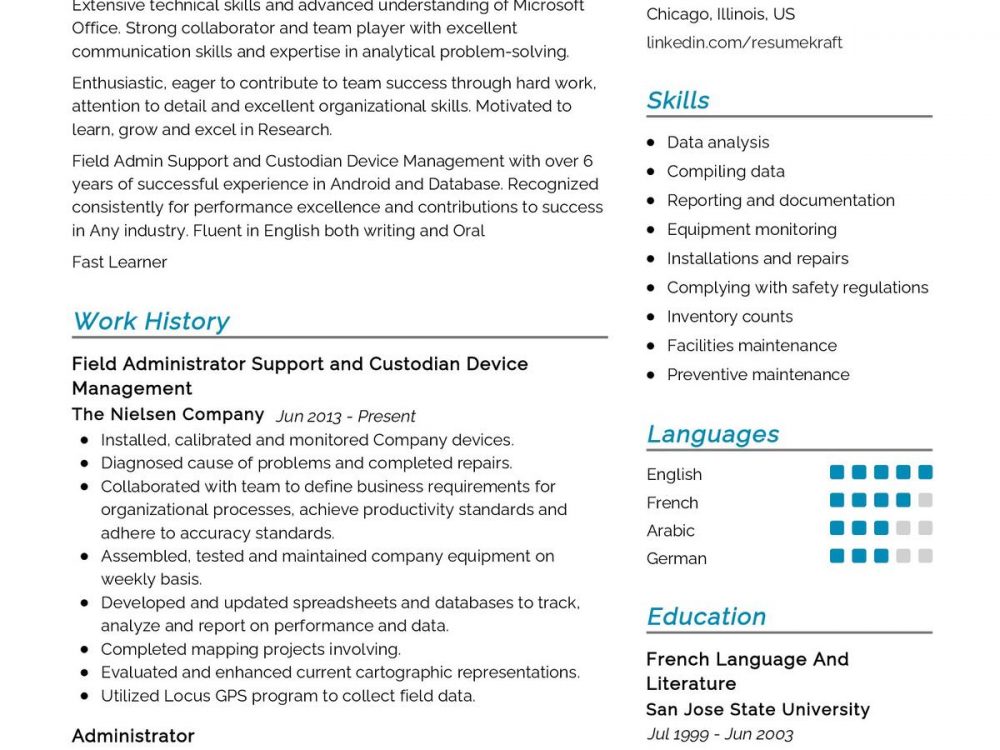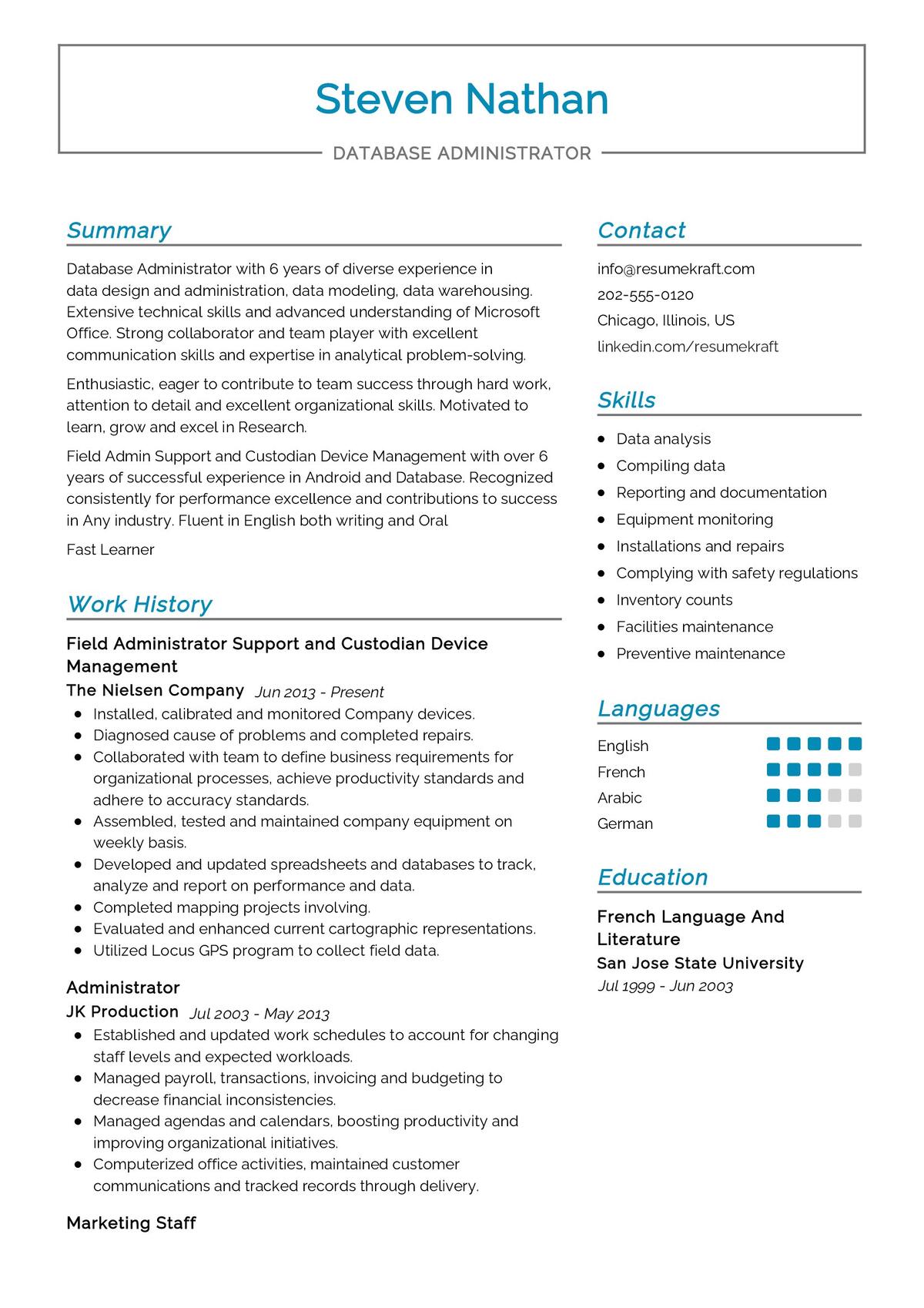What Should Be Included In A Database Administrator Resume?
When writing a resume for a Database Administrator position, it is important to include relevant information about your qualifications, experience, and accomplishments. The goal of your resume is to give potential employers a clear picture of your qualifications and skills, so that they can make an informed decision when considering you for the job. Here are the key elements that should be included in your Database Administrator resume:
Your professional summary should provide a brief overview of your qualifications and job history. Here, you should include the most relevant details about your experience, such as the type of databases you have experience managing, the size of the databases, and the reasons for which the databases were implemented. You should also mention any certifications or awards you have received that demonstrate your knowledge and technical proficiency.
Your work experience section should provide a detailed list of your past job roles, including any database-related responsibilities. This is where you should highlight the specific tasks you have completed, such as creating and maintaining databases, verifying data accuracy, performing database backups, and troubleshooting any problems. It is also important to mention any tools and technologies you are familiar with, such as SQL, Oracle, and PostgreSQL.
In the skills section, you should include any technical skills or knowledge you have acquired through your work experience, such as database security, data modeling, and database optimization. If you have any certifications related to database administration, be sure to include them here as well. Additionally, you should list any soft skills you possess, such as communication, teamwork, and problem solving.
Finally, you should provide a list of courses and seminars you have taken related to database administration. This will demonstrate your commitment to staying up-to-date on the latest industry trends and technologies . It will also show that you are eager to learn new techniques and strategies to better manage databases.
What Skills Should I Put On My Resume For Database Administrator?
When writing a resume for a Database Administrator position, it is important to emphasize the right skills and qualifications to show that you are the best fit for the job. Database Administrators are responsible for managing databases, ensuring that they are secure and optimized, and troubleshooting any issues that arise. Therefore, employers are looking for candidates who have strong technical, analytical, and communication skills.
When it comes to skills, the most important ones to highlight on a Database Administrator resume are technical and software knowledge. Be sure to list any programming languages, operating systems, and database software you are familiar with, as well as any certifications or qualifications you have. It is also important to demonstrate your understanding of databases and database design, as well as the ability to analyze information and make decisions based on the data.
Aside from technical skills, employers are also looking for candidates with strong interpersonal and communication skills. Database Administrators must be able to work with a variety of stakeholders, from IT personnel to end users, so it is important to demonstrate your ability to collaborate, communicate effectively, and solve problems. Additionally, employers want to hire candidates who have experience in customer service, so showcasing any customer service experience you have can be beneficial.
Finally, employers will be looking for candidates who are organized, detail-oriented, and able to work with minimal supervision. These skills are essential for Database Administrators, as they are often working on multiple tasks and projects at any given time. Be sure to emphasize your ability to meet deadlines, manage projects, and stay organized.
What Is The Job Description Of The Database Administrator?
A Database Administrator (DBA) is responsible for managing, maintaining and administering databases and related systems. They ensure that these systems meet the changing needs of the organization. They are responsible for the design, implementation, maintenance, security and performance of the databases. They also provide technical assistance and troubleshooting when needed.
The main tasks of a Database Administrator include the following: designing and implementing database structures, creating backup procedures, monitoring performance and troubleshooting issues, implementing security measures, managing users, and administering user access. They are also responsible for developing and executing database queries and developing database applications. Additionally, they need to stay up-to-date on current technologies and trends in the database industry.
Database Administrators must possess strong technical skills, such as knowledge of database design principles, database languages, database systems, and database management systems. They also need to have excellent communication and problem-solving skills. It is important for Database Administrators to be able to apply their knowledge to complex problems and to have the ability to work independently and as part of a team.
It is essential for Database Administrators to be familiar with a wide range of database software and tools. They should have a good understanding of relational database management systems (RDBMS) and be able to use SQL, PL/SQL, T-SQL and other database languages to write and maintain database programs. They should also be familiar with database system design, database optimization, and database security.
Database Administrators need to take the initiative to stay up-to-date on new industry trends and technologies, in order to be able to keep up with the changing needs of their organization. They must be able to work well under pressure and consistently deliver results
What Is A Good Objective For A Database Administrator Resume?
When writing a resume for a database administrator position, it’s essential to include an effective objective statement. The objective statement should be concise, yet provide enough information to allow the hiring manager to get a good feel for the applicant’s credentials and the value they can bring to the company. An objective statement should be tailored to the job opening, emphasizing the applicant’s experience and qualifications that align with the position’s required skills and duties.
When it comes to writing a good objective statement for a database administrator resume, one should focus on the applicant’s technical skills, familiarity with database software, and experience with data security and maintenance. For example, a great objective for a database administrator resume might be something like: “Experienced database administrator with a proven track record of optimizing database performance, creating secure systems, and providing superior technical support.” This statement emphasizes the applicant’s technical capabilities, which is essential for the position.
It’s also important to showcase the applicant’s ability to work on multiple projects, their team-building skills, and their ability to stay up-to-date on the latest technology and trends in the industry. This can be accomplished by adding a sentence to the resume objective statement that includes your experience with multitasking, team building, and staying current on the latest industry developments. For example, a great objective statement might be: “Highly motivated database administrator with a passion for multitasking, team building, and staying up-to-date on the latest industry trends.”
When writing a resume objective statement for a database administrator resume, make sure to include relevant skills and experience that will make you stand out to potential employers . Show that you are the best candidate for the position by highlighting your ability to multitask, build teams, and keep up with the latest technology. Doing so will help you stand out from the competition and give you the edge you need to secure the job.
What Are The Career Prospects In The Database Administrator?
The role of a Database Administrator is becoming increasingly important in today’s world, with the need for highly organized, secure, and easily accessible data storage. Database Administrators play a critical role in any organization as they store, manage, and maintain the data used by the organization. The career prospects for Database Administrators are very promising, with a wide range of job opportunities available.
Database Administrators can work on a variety of projects in many different industries. They can specialize in various areas such as cloud computing, data security and compliance, or data analysis. Database Administrators can work in a wide range of roles, from individual project managers to team leaders in larger organizations.
The job of a Database Administrator is demanding but rewarding. As the demand for data storage increases, the need for skilled Database Administrators will also increase. Database Administrators are responsible for ensuring that the data stored and maintained by their organization is secure and easily accessible. They must also be able to troubleshoot any issues that arise from the data stored.
The salaries for Database Administrators vary greatly depending on experience, qualifications, and the specific role. Entry-level Database Administrators can expect to earn around $85,000 to $155,000 per year, while experienced Database Administrators can earn up to $100,000 per year.
In addition to the financial rewards, Database Administrators can also benefit from other benefits such as flexible working hours, health insurance, and vacation time. A career in Database Administration can be extremely rewarding and offer a great challenge and satisfaction.
Key Takeaways for an Database Administrator resume
When writing a Database Administrator resume, there are several key takeaways to keep in mind. Primarily, your resume should be tailored to the job description and highlight your related skills, accomplishments, and experience. In addition to soft skills such as problem-solving, communication, and time management, your resume should also focus on hard skills such as database programming, database design, and database security.
Be sure to include any certifications you may have received for applicable software, as well as any relevant courses or training. When detailing your experience, include your job title, the company you worked for, and the time frame you worked there. Additionally, focus on the accomplishments and responsibilities you had in each role.
When it comes to education, make sure you include any degrees or certifications that relate to the job. Finally, make sure your resume stands out by including a professional summary, a skills section, and a list of any relevant awards or publications. By following these key takeaways, you’ll be sure to create an effective Database Administrator resume.
By highlighting the right skills and qualifications, you can demonstrate that you are the best fit for the Database Administrator position . Employers look for candidates who have the technical know-how and soft skills needed to excel in the role. It is important to emphasize your knowledge of database management systems, such as Oracle, SQL Server, and MySQL, as well as your understanding of database security, backup, and recovery procedures.
Additionally, employers will be looking for candidates who have strong problem-solving, communication, and analytical skills, are highly organized, zealous, detail-oriented, and able to work with minimal supervision. Furthermore, your ability to prioritize tasks, meet deadlines, and manage multiple projects simultaneously will be essential for success as a Database Administrator.



